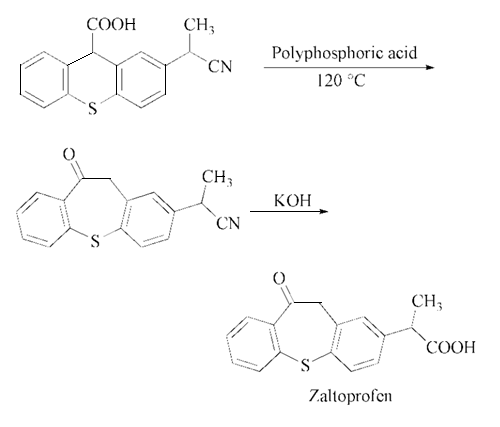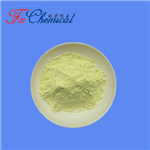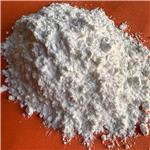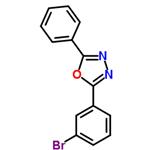
Zaltoprofen
- Product NameZaltoprofen
- CAS89482-00-8
- CBNumberCB3441374
- MFC17H14O3S
- MW298.36
- EINECS277-973-5
- MDL NumberMFCD00864323
- MOL File89482-00-8.mol
Zaltoprofen Chemical Properties,Usage,Production
Description
Zaltoprofen is a potent non-steroidal antiinflammatory drug (NSAID) with analgesic activity. In rats and mice, zaltoprofen is reported to be equipotent or superior to other NSAlDs in bradykinin-induced pain, acetic acid-induced writhing, carrageenan-induced hyperalgesia, and in several other experimental models of analgesia. It acts by selectively suppressing the production of prostaglandins at the inflammatory site and not in other organs such as stomach and kidney, therefore, has remarkably low gastric side effects that are associated with conventional antiinflammatory agents.Chemical Properties
Off-White to Pale Yellow Crystalline SolidOriginator
Nippon Chemiphar (Japan)Uses
Anti-inflammatory activity resides in (S)-enantiomerDefinition
ChEBI: Zaltoprofen is an organic molecular entity.Manufacturing Process
Zaltoprofen may be prepared in 4 steps:1. Preparation of 2-(3-carboxymethyl-4-nitrophenyl)propionic acid:
Dimethyl malonate (4.04 g, 30.6 mmol), potassium t-butoxide (3.43 g, 30.6 mmol) and anhydrous N,N-dimethylformamide (15 ml) were mixed and stirred for 10 minutes in a nitrogen atmosphere at 90°C. The mixture was then cooled to room temperature, and to the cooled mixture was added a solution of diethyl 2-(3-chloro-4-nitrophenyl)-2-methylmalonate (5.04 g, 15.3 mmol) prepared in the manner as described in Japanese Patent Publication No. 47- 45, 746) in anhydrous N,N-dimethylformamide (15 ml). The resulting mixture was stirred at 90°C for 3 hours, and then poured into 1 N hydrochloric acid (30 ml). The mixture was subjected to extraction using two portions of diethyl ether. The ether extracts were combined, washed successively with water and an aqueous saturated sodium chloride solution, and dried over anhydrous sodium sulfate. The dried extract was placed under reduced pressure to give 7.97 g of yellow oil. The oil was adsorbed on silica gel (16 g) and subjected to moderate pressure silica gel column chromatography. The adsorbed oil was eluted using a mixture of ethyl acetate/hexane (1/3, v/v) to give 4.33 g (yield: 66.7%) of diethyl 2-[3-bis(methoxycarbonyl)methyl-4-nitrophenyl]-2- methylmalonate as a yellow oil.
The diethyl 2-[3-bis(methoxycarbonyl)methyl-4-nitrophenyl]-2- methylmalonate obtained above,(4.13 g, 9.71 mmol) was dissolved in acetic acid (40 ml). To the solution were added water (16 ml) and concentrated sulfuric acid (4 ml), and the resulting mixture was heated for 15 hours under reflux. The acetic acid was distilled off under reduced pressure. The residue was concentrated under reduced pressure after addition of toluene. The precipitated crystals were collected by filtration and washed with water to give 2.06 g of the desired compound as a pale brown crystalline product. The filtrate and washing were combined and subjected to extraction using ethyl acetate. The ethyl acetate portion was washed successively with water and an aqueous saturated sodium chloride solution, and dried over anhydrous sodium sulfate. The solvent was distilled off under reduced pressure to leave 0.32 g of 2-(3-carboxymethyl-4-nitrophenyl)propionic acid as a yellow crystalline product. The total amount was 2.38 g (yield: 96.8%).
2. Preparation of 2-(4-amino-3-carboxymethylphenyl)propionic acid disodium salt:
In 0.5 N aqueous sodium hydroxide solution (0.8 ml) was dissolved 2-(3- carboxymethyl-4-nitrophenyl)propionic acid (50 mg, 0.2 mmol). The solution was stirred for 18 hours at room temperature in a hydrogen gas atmosphere, after addition of 10% palladium/carbon (10 mg). Insolubles were removed by filtration, and the filtrate was concentrated under reduced pressure to give 55 mg (yield: quantitative amount) of the desired compound as a colorless oil.
3. Preparation of 2-(3-carboxymethyl-4-phenylthiophenyl)propionic acid:
In 2 N hydrochloric acid (0.5 ml) was dissolved 2-(4-amino-3- carboxymethylphenyl)propionic acid disodium salt, 53 mg, 0.2 mmol). Sodium nitrite (14 mg, 0.2 mmol) was added to the resulting solution under stirring and chilling with ice. The mixture was stirred for 30 minutes under chilling with ice. The mixture was then neutralized with a chilled aqueous saturated sodium acetate solution. To the neutralized mixture was added a solution of thiophenol (0.02 ml, 0.2 mmol) in 6 N aqueous sodium hydroxide solution (0.1 ml), and the mixture was stirred for 2 hours at room temperature. The reaction mixture was then made acidic by addition of 2 N hydrochloric acid, and extracted with ethyl acetate. The ethyl acetate portion was extracted with an aqueous saturated sodium hydrogen carbonate solution. The aqueous portion was then made acidic by addition of 6 N hydrochloric acid and extracted with ethyl acetate. The ethyl acetate portion was washed successively with water and an aqueous saturated sodium chloride solution, and dried over anhydrous sodium sulfate. The solvent was distilled off under reduced pressure to give 28 mg (yield: 45%) of the 2-(3-carboxymethyl-4- phenylthiophenyl)propionic acid.
4. Preparation of 2-(10,11-dihydro-10-oxodibenzo[b,f]thiepin-2-yl)propionic acid [i.e., Zaltoprofen]:
2-(3-Carboxymethyl-4-phenylthiophenyl)propionic acid prepared above (174mg, 0.55 mmol) was mixed with polyphosphoric acid (3.5 g). The mixture was stirred at 60°-70°C for 3 hours. The reaction mixture was then extracted with ethyl acetate after addition of chilled water. The ethyl acetate portion was washed successively with water and an aqueous saturated sodium chloride solution, and dried over anhydrous sodium sulfate. The solvent was distilled off under reduced pressure to leave a brown crystalline residue. The residue was recrystallized from benzene-hexane, to give 123 mg (yield: 75%) of the desired compound as a pale yellow crystalline product. MP: 130.5°-131.5°C. The structure of compounds was confirmed with 1 H-NMR spectrum.
brand name
Soleton; PeonTherapeutic Function
Antiinflammatory, AnalgesicClinical Use
Zaltoprofen is a non-steroidal anti-inflammatory drug originated by Nippon Chemiphar and jointly developed with Zeria. It has been available on the market in Japan since 1993 for the relief of pain and inflammation resulting from arthritis deformations, periarthritis of the shoulder, neck-shoulder-arm syndrome, rheumatoid arthritis, lumbago, postsurgery pain, trauma, and tooth extraction and used in oral doses of 80 mg . According to studies, the analgesic effects of zaltoprofen may involve the inhibition of bradykinin-2 receptormediated responses in primary afferent neurons . Although zaltoprofen is marketed as a racemate the anti-inflammatory activity resides in the (S)-enantiomer.Synthesis
The cyclization of 5-(1- cyanoethyl)-2-(phenylthio)phenylacetic acid in presence of polyphosphoric acid at 120 ℃ gives 2-(10-oxo-10,11-dihydrodibenzo[b,f ]thiepin- 2-yl)propionitrile, which is then hydrolyzed with KOH in refluxing ethanol – water to zaltoprofen.
Preparation Products And Raw materials
Zaltoprofen Supplier
Global(114)Suppliers
| Supplier | Tel | Country | ProdList | Advantage | |
|---|---|---|---|---|---|
| +86-13131129325 | sales1@chuanghaibio.com | China | 5887 | 58 | |
| +8613043004613 | Sara@xmwonderfulbio.com | China | 283 | 58 | |
| +86-(0)57185586718 +86-13336195806 |
sales@capot.com | China | 29792 | 60 | |
| +86-0371-55170693 +86-19937530512 |
info@tianfuchem.com | China | 21632 | 55 | |
| +86-86-5926051114 +8618959220845 |
sales@amoychem.com | China | 6383 | 58 | |
| +86-0371-86658258 +8613203830695 |
factory@coreychem.com | China | 29809 | 58 | |
| +86-13806087780 | sale@simagchem.com | China | 17365 | 58 | |
| +86-86-13583358881 +8618560316533 |
Ethan@dornechem.com | China | 3094 | 58 | |
| +86-29-89586680 +86-15129568250 |
1026@dideu.com | China | 22787 | 58 | |
| +86-027-59207850 | info@fortunachem.com | China | 5972 | 58 |
View Lastest Price from Zaltoprofen manufacturers
89482-00-8, ZaltoprofenRelated Search
PROMPT×
PROMPT
The What'sApp is temporarily not supported in mainland China
The What'sApp is temporarily not supported in mainland China
Cancel
Determine


